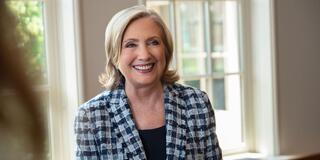Q&A: Hillary Rodham Clinton

Hillary Rodham Clinton — the former secretary of state, senator, and first lady— joined the Columbia SIPA faculty in February as a professor of international and public affairs. She spoke with SIPA Magazine about the new Institute of Global Politics (IGP), her teaching plans, and more.
It was big news when you joined our faculty, and some people want to know why SIPA? What drew you to the School?
I had been talking with Columbia for a number of years about ways we could partner, and I was particularly struck by the exciting approach that SIPA was taking toward a lot of the problems of our time. On a personal level, I’ve been looking for opportunities to get back into the classroom for a while. But what really drew me to this school is its unique approach to tackling geopolitical issues in a way that combines the academic rigor of the University with the experience and know-how of its incredible faculty and leadership.
You’ve worked with Dean Keren Yarhi-Milo to conceptualize and develop plans for the Institute of Global Politics. What is your personal vision for the Institute?
We are globally positioned to be a leader in investigating a lot of the problems that we find at home and around the world, and more than simply convening people, we want to bring them together as collaborators to analyze problems that we face and put out practical solutions.
In many ways, IGP is an extension of the valuable work that SIPA has always done. I believe it can help cut through gridlock and bring together various parts of the University and participants from both inside and outside of Columbia to drive impact in the real world and perhaps raise visibility in the process.
What will distinguish IGP from other similar institutes of politics at peer schools?
I very much admire the work done elsewhere, but I think the very clear focus from the beginning on global politics defines us somewhat differently to start with, as does Columbia’s incredible placement in New York City and the Columbia Global Centers around the world that are going to be partners in this effort.
What do you see as some of the most pressing global challenges that we face today? Have they changed since you left office as secretary of state?
Some are continuing, like climate change and renewable energy transition. Some are more acute, like the protection and promotion of democracy. Some are universal, like human rights challenges. I think there is a tide that moves backwards and forwards in our history as to what needs to be focused on continually and what rises to a new level of attention and urgency at a particular time.
I’m very hopeful that the Institute—because of SIPA’s very deep bench of faculty and outside support—will be very well positioned to deal with both the immediate and the longer term simultaneously.
You’re the chair of IGP’s faculty advisory board. What role will the board and SIPA faculty play?
I’ve been very excited by the positive reaction to IGP. SIPA faculty have expressed interest in everything from developing new research to examining how better to involve students to ensuring that participants in our events reflect a broad range of perspectives. Faculty members have a lot of work to do already, but there seems to be a level of both excitement and commitment that is very promising.
You’ve worked with some of our faculty members previously. It must be nice to join a new team and still see some familiar faces.
I’m thrilled again to be surrounded by people who I have such high regard for, like Jack Lew, Michael Nutter, and Joe Stiglitz. And I look forward to working with other faculty whose scholarship I’ve heard of but who I haven’t met. And, of course, Dean Yarhi-Milo. I also know the new president of Columbia [Minouche Shafik]; I’m excited to have her on campus.
Not everyone knows that you’ve taught graduate students before. Are you excited about teaching again? What can students expect from your course, Inside the Situation Room?
When I taught many years ago, at the University of Arkansas Law School, I especially liked all the student interaction, so I’m very much looking forward to being back in the classroom.
I’m also looking forward to co-teaching with Dean Yarhi-Milo and covering material that reflects not only my experience in the area of international affairs and diplomacy, but also the dean’s academic work and the political theory that can explain decision-making and individual leaders’ calculations.
The course will give students an inside look at how decisions are made and what factors have to be taken into account, what happens when things go wrong, and how you try to deal with that. It’s going to be a terrific course and a lot of fun.
Are you working on anything else at SIPA?
In addition to setting up IGP and preparing for the course, I’m serving on a faculty search committee. I am also very committed to finding ways to ensure that questions about women’s leadership are addressed. Lastly, at Columbia World Projects, I’m collaborating with Ira Katznelson on digital governance and with Wafaa El-Sadr on wastewater infrastructure. So I think I have a pretty full plate, and I’m very excited to get to work.
This interview has been condensed and edited for clarity.